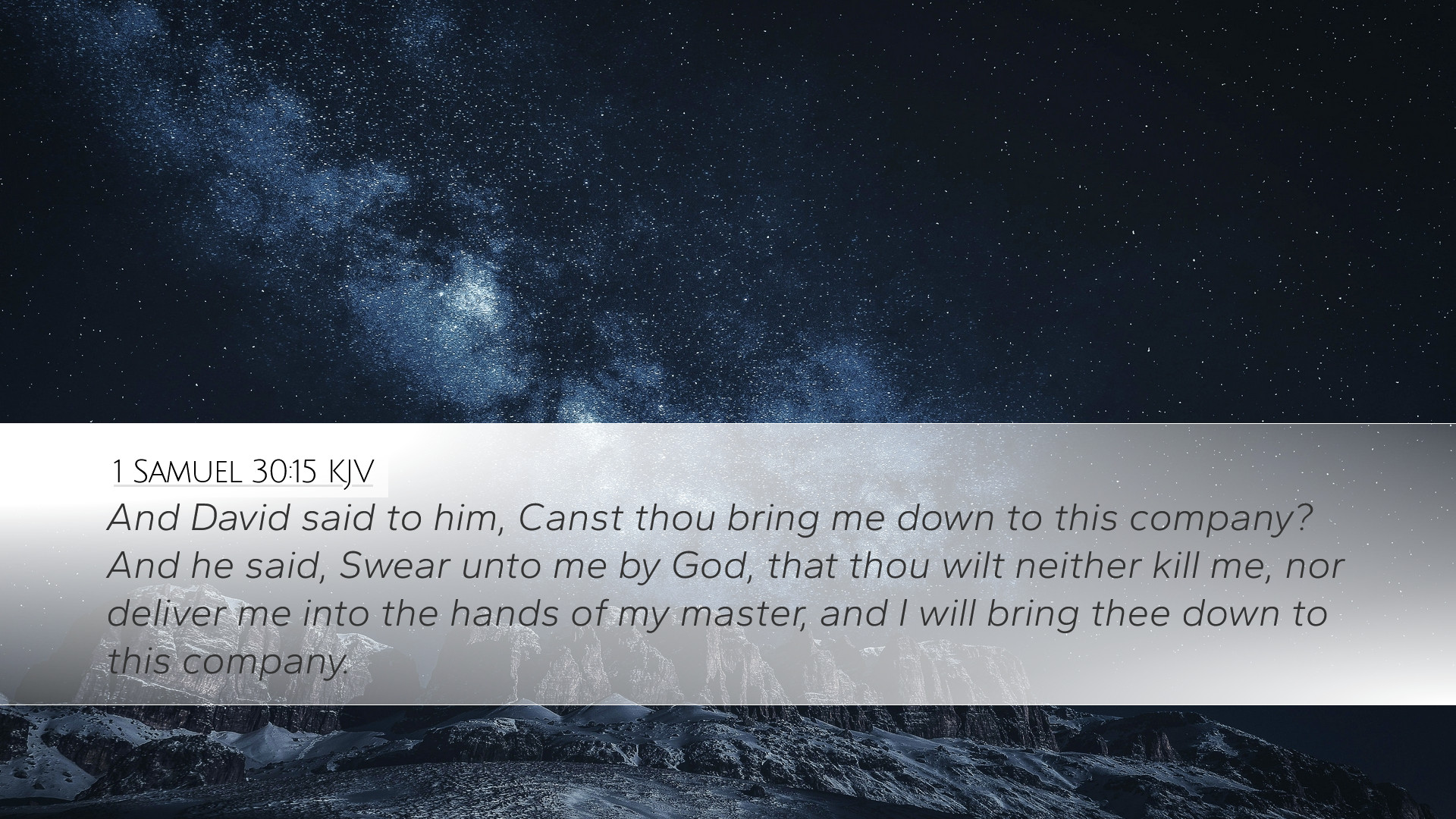Commentary on 1 Samuel 30:15
Text: "And David said to him, Canst thou bring me down to this company? And he said, Swear unto me by God, that thou wilt neither kill me, nor deliver me into the hands of my master, and I will bring thee down to this company." (1 Samuel 30:15)
Introduction
The context of 1 Samuel 30 presents a critical moment in David's life, situated between his increasing popularity and the complications of his leadership amid conflict. This verse encapsulates a pivotal point where David, faced with a significant decision regarding the Amalekite raiders, seeks both guidance and alliance. The dynamics unfolding here are rich with theological insights, applicable for pastors, students, theologians, and scholars alike.
Historical Context
David, during this period, was gathering followers while fleeing from King Saul. The Amalekites had invaded Ziklag, burning the city and taking captives, including David’s family. This distressing situation highlights not only the peril of David and his men but also the underlying themes of loyalty, mercy, and the human condition in times of crisis.
Exegesis of the Text
This verse reveals multiple dimensions of David’s character and his reliance on God’s providence. David’s question to the Egyptian servant, "Canst thou bring me down to this company?" indicates a strategic approach to recovering lost family and possessions. The servant’s response is significant, emphasizing the interdependence found in human relationships, especially in dire circumstances.
Insights from Matthew Henry
Divine Providence: Matthew Henry emphasizes the providential care of God even in desperate circumstances. David, despite his hardships, knows to seek God’s direction and assistance through the revelation of His plans. He mirrors the believer's need to rely on God’s guidance before actions are taken.
The Role of Trust: Henry also takes note of the servant’s hesitation. The servant’s request for an oath underscores a deep mistrust born from his experience of betrayal. This serves as a reminder of the importance of creating an environment of trust, especially within community leadership.
Insights from Albert Barnes
Strategic Leadership: Albert Barnes highlights David's wisdom in engaging with the servant rather than acting impulsively. This encounter illustrates a leader's capacity to discern and utilize available resources authentically, exemplifying good leadership practices that involve careful assessment of situations before acting.
Redemption and Mercy: Barnes notes the grace involved in the Egyptian servant’s inclusion in David's plan. Despite previous animosities, mercy becomes a tool of reconciliation that not only aids in the pursuit of the Amalekites but also illustrates the broader redemptive narrative woven throughout scripture.
Insights from Adam Clarke
Thematic Reflection: Adam Clarke elaborates on the themes of loyalty and betrayal in this narrative. The servant's fear reflects a universal human concern for survival and security amidst conflict. Clarke points out that this moment drives home the truth that in pursuit of our mission, we must confront the complexities of human relationships with wisdom and empathy.
Spiritual Application: Clarke encourages readers to recognize the moral implications of David's dialogue with the servant. It showcases a model of humility and seeking common ground, which not only serves practical ends but builds spiritual bridges vital for community cohesion.
Theological Implications
This verse raises significant theological questions about authority, loyalty, and redemption. David’s inquiry reflects a leader’s duty to explore all avenues for restoration. This scenario evokes the broader narrative of God seeking and redeeming his people amidst adversity.
It also emphasizes the nature of leadership that values every person's insight, regardless of their past or status. The willingness to engage the servant shows the transformative potential of mercy, reinforcing the belief that no individual is beyond hope or usefulness in God’s plan.
Conclusion
1 Samuel 30:15 is a profound verse that layers multiple lessons in leadership, trust, and divine guidance. It invites scholars and theologians to reflect on how God orchestrates events, even through unexpected characters. For pastors and students, it underscores the necessity of relying on God’s wisdom and the importance of mercy in human relationships, showing that in the pursuit of God’s kingdom, every voice matters and every soul can play a part in restoration.


